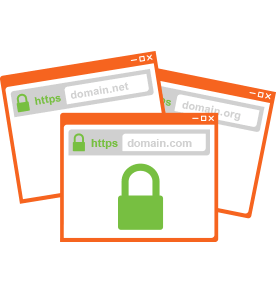
Multi-Domain/SAN/UCC SSL Certificate
Protect multiple domains with one Multi-Domain SAN SSL certificate
Subject Alternative Names or SAN Certificates secure multiple domains names on the web servers with a single SSL certificate. SAN SSL certificates are also widely known as Unified Communications (UCC) certificates in the web security world. By utilizing this highly versatile single SAN certificate, you can protect multiple fully-qualified domain names (FQDN), private host names, IP addresses, web servers host names and as well as firewall devices and payment gateways.
A Subject Alternative Names certificate is a comprehensive and easy way to protect Unified Communications and multiple host names while saving you some money, but more importantly; time. SAN certificates have been highly recommended since 1999 by Microsoft specifically for Microsoft Exchange Server 2007, Microsoft Exchange Server 2010 and Office Communications Server 2007 & 2010. Microsoft Exchange Server 2007, 2010 and 2013 are fully compatible with all Communications servers as well as gateway and firewall devices.
Key Benefits of Subject Alternative Names (SAN) Certificates
- Protection of Multiple Fully Qualified Domain Names (FQDN) with a Single SSL Certificate. You can secure multi-level domains such as www.yourname.com & www.yourname.org
- One IP address for Multiple Hosted SSL websites. Normally, hosting multiple websites on a single web server requires a different IP address for each website that you want to make secure with an SSL; however, if you use a SAN certificate, then SSL multiple encrypted sites can be hosted on a single web server and IP address.
- Easy to Manage Exchange Web Servers 2007 & 2010. Using a SAN certificate can reduce many technical processes normally needed to make SSL certificates active on numerous websites; such as, configuration of multiple IP addresses on Exchange web servers 2007 & 2010 and integrating each IP address to the individual certificate. All these steps are necessary and usually take a lot of time; however if you use a SAN certificate, it's easier and quicker for protecting multiple websites and more cost-effective because you can do it with one IP on a single server.























